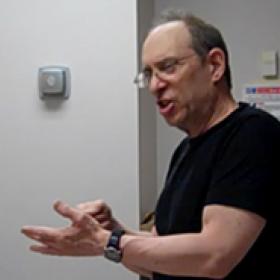After getting his bachelor’s degree in political science and teaching certification from Boston University, Gene Fellner joined the Attica Brothers Legal Defense, the organization defending the 61 prisoners accused of leading the 1971 Attica Prison uprising. Years later, when the trials were over, he began his career as a fine artist though he continued activist work, going to Nicaragua as a brigadista in the 1980s to support the Nicaraguan Revolution. In 1986, Fellner was named Distinguished Artist of New Jersey by the New Jersey State Council on the Arts. In 2004, Fellner founded Seven Stories Institute (SSI), an organization dedicated to introducing disenfranchised communities to the books that have those communities as their subjects and setting up conversations between community members and the authors of those books. In 2006, Fellner was hired by New Jersey City University to mentor language arts middle school teachers in some of the most underperforming middle schools in Newark where he continues to work. Professor Fellner explores the spaces where art and research meet and collaborates with his students to develop methodologies that illuminate and scaffold their many strengths.
Degrees
PhD in Urban Education, Graduate Center, CUNY
MA in ESL, New Jersey City University
BA in Political Science, Boston University
Fellner, G., (in press). Evoking the despair of beginning teachers through arts-based research in Critical Pedagogy for Healing: A Soul Revival of Teaching and Learning edited by Chris Emdin, Tricia Kress & Bob Lake.
Kwah, H. Fellner, G., and Waldman, P. (spring 2020). After positivism: Three scenes in a bricolage. Taboo: The Journal of Culture and Education, 19:2, pp. 6-21.
Fellner, G., 2019. The demon of hope: Race, disability and the white researcher’s complicity with injustice, Art|Inquiry International, 4:2, pp. 545-567. doi: https://doi.org/10.18432/ari29449
Fellner, G. (2018), ‘You get tenure, what do I get?: Using art to interrogate a researcher’s dilemma’,
Visual Inquiry: Learning & Teaching Art, 7:3, pp. 169–81, doi: 10.1386/vi.7.3.169_1.
Fellner, G., Kwah, H. (2018). Transforming the embodied dispositions of pre-service special education teachers. International Journal of Qualitative Studies in Education. 31:6, pp. 520-534.
DOI: 10.1080/09518398.2017.1422291
Fellner, G., Comesañas, M., Duperoy, L., & Duperoy, Y. (2017). What it means to be special: Two sisters discuss their experiences (22 manuscript pages). Disability & Society. DOI: 10.1080/09687599.2017.1296817
Fellner, G. (2015). The problem is education not “special education.” Cultural Studies of Science Education, 10(4), 1089–1101. http://doi.org/10.1007/s11422-013-9559-7
Fellner, G. (2015). A multilectical approach to research in inner city schools. Doing educational research (2nd ed., pp. 181–197). Rotterdam, The Netherlands: Sense Publishers.
Fellner, G. (2015). Multilectics and its methods. In C. Milne, K. Tobin, & D. deGennaro (Eds.), Sociocultural studies and implications for science education (pp. 33–58). Rotterdam, The Netherlands: Springer.
Fellner, G. (2014). Broadening our lenses of perception to advance learning: An introduction to multilectics, International Journal of Teaching and Teacher Education 37 169-182.
Fellner, G. (2013). Toward a broader dialectic: What Marx and Mailer tell us about social life and theory. International Journal of Qualitative Studies in Education. DOI: 10.1080/09518398.2013.825346
Fellner, G. (2013). It’s education, not “special education”. Cultural Studies of Science Education. DOI: 10.1007/s11422-013-9559-7
Fellner, G., Pitts, Wesley and Zuss, Mark. (2012). Beyond the sensible world: A discussion of Mark Zuss’ The practice of theoretical curiosity. Cultural Studies of Science Education: 7, (3), 745-60.
Fellner, G. and Siry, C. (2010). Reconceptualizing the relationship between universities and schools: a dialectic and polysemic approach. Cultural Studies of Science Education: 5, (3), 775-86. Recent book chapters
